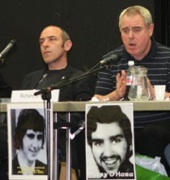
The Republican Network for Unity held an event last weekend called “What is the Truth Behind the Hunger Strike?” to examine issues which have arisen in recent years regarding the negotiations which took place in 1981.
Panellists included Richard O’Rawe, former PRO of the protesting prisoners in the H-Blocks, and Brendan Duddy, the businessman who acted as go between for the IRA and the British government for many years.
Duddy described receiving British messages, generally in phone calls from MI6, and handing them to “an IRA volunteer” who conveyed them to Gerry Adams.
Duddy is still refusing to confirm or deny claims that he was the man referred to as the ‘Mountain Climber’, but several speakers at the debate named his as such.
The hunger strikers pursued five demands which would have effectively allowed them to be treated as political prisoners or prisoners of war, and not as criminals, the policy of the Thatcher regime.
The debate on Sunday focused on the days following July 4, 1981, when three hunger strikers had died and another, Joe McDonnell, had days to live.
In an extraordinary breakthrough, Bobby Sands had been elected MP for Fermanagh and South Tyrone and Sinn Féin planned to field Owen Carron, a party member, in the by-election caused by Sands’ death.
Sinn Féin’s normal policy was to refuse to recognise the legitimacy of the state, and therefore not to contest elections. Some felt this was a hindrance to the development of a potential alternative strategy to armed struggle.
The controversial question which O’Rawe raised was whether the protest was prolonged, with six more deaths in the jail and more on the streets, in order to get Carron elected and propel the Sinn Féin leadership’s political ambitions.
The prisoners issued a statement on July 4 in which they dropped any mention of political status and instead asked for reforms in the prison regime which could apply to all prisoners, including criminals.
Documents published recently indicated that a recasting and combining of existing offers was considered by the British government, but without any appearance of a concession.
Sinn Féin has insisted no concrete deal was on offer from the British government which would have allowed the hunger strike to end.
Party leadership figures, as well as the then IRA Officer in Command in Long Kesh, Brendan ‘Bik’ McFarlane, have vehemently denied this version of events, but declined to take part in the debate last weekend for various reasons.
Mr O’Rawe has claimed that on July 5, McFarlane consulted him on a substantial offer in a conversation in Irish shouted from cell to cell.
O’Rawe says that he understood that he and McFarlane felt the offer was close enough to the prisoners’ proposals to end the strike but the IRA army council was not persuaded.
At the meeting Duddy confirmed that he had passed on a message regarding the (potential) British offer that it had not been accepted by the IRA. For reasons that are still not clear, the putative offer was never revisited following the death of Joe McDonnell
Later another former Blanketman, Gerard Clarke, spoke from the audience to say that he had also decided to speak out. He had been in an adjoining cell and had overheard the conversation. He confirmed O’Rawe’s account and believed that most prisoners would have accepted the offer.
A hunger striker, Gerard Hodgins, said that he had never been informed of what was on offer and former leaders of the IRSP and INLA, three of whose prisoners had died, said that their members had not been informed.
In speeches heavy with emotion and regret, they told how hunger strikers had died believing the situation was hopeless. They made it clear that they would have recommended acceptance of the offer if they had known of it.
In a separate newspaper interview, Mr McFarlane said “there was never any deal”.
“The British opened the conduit,” he said. “They said it was to bring about a resolution.
“But they had to go in with a piece of paper to the hunger strikers and say have a read of it, and ask whether we wanted to accept what they were offering -- be it one or two concessions or whatever.
“But the British never came in because no deal existed and it didn’t happen.”
Mr McFarlane claimed an effort was underway “to target Gerry Adams and discredit both him and Sinn Féin.
“What it’s actually doing is accusing him of killing the hunger strikers, which is absolutely preposterous.”
“The whole thrust of this is coming from information that certain journalists requested from the British government.
“But the government and the journalists didn’t release it all”.
Following the debate, the alleged ‘Mountain Climber’ said he intended not to speak about the hunger strike period again. “After tonight I will not be talking to journalists in respect of this because I feel that the hurt that is going on is desperate for the people that lived through that era to bear,” Mr Duddy said.
![[Irish Republican News]](https://republican-news.org/graphics/title_gifs/rn.gif)
![[Irish Republican News]](https://republican-news.org/graphics/title_gifs/harp.gif)

